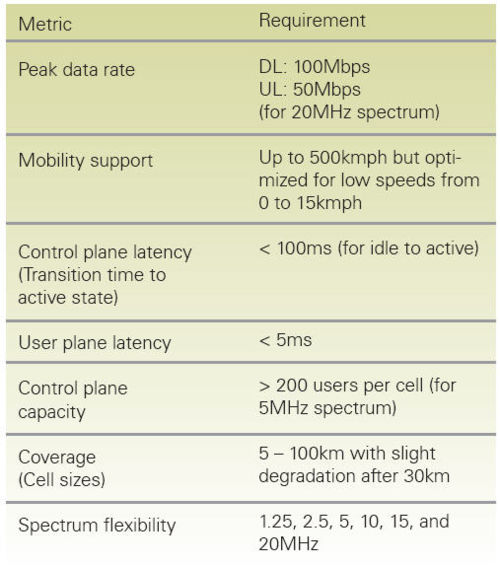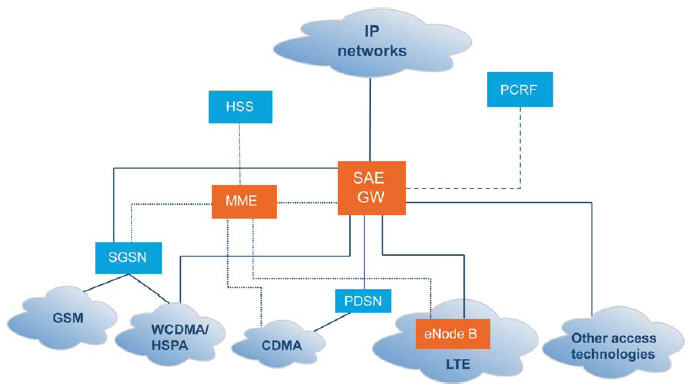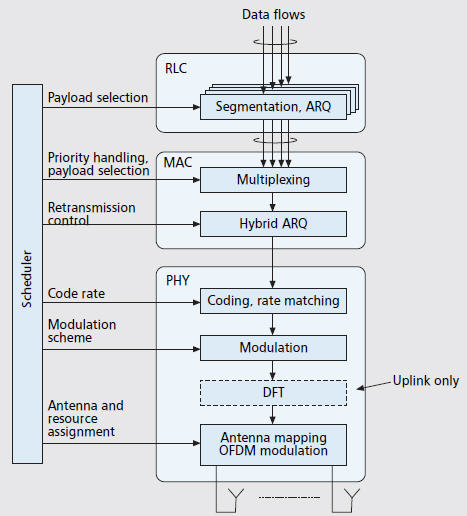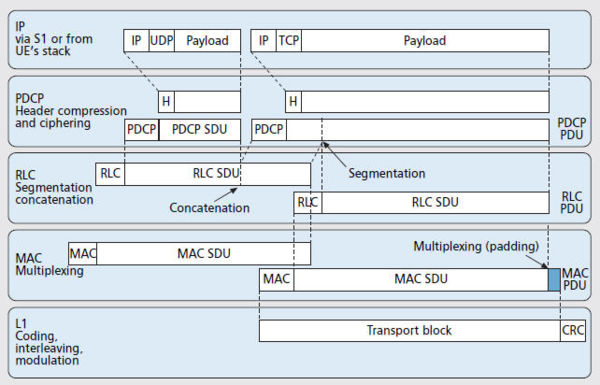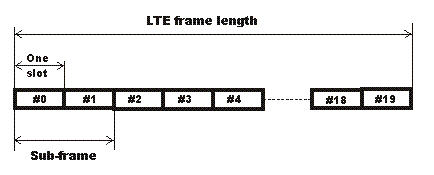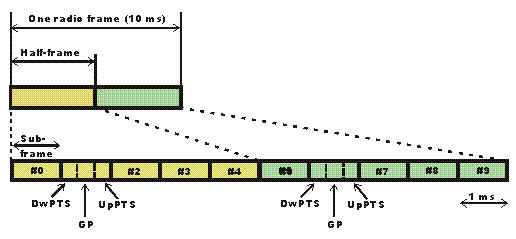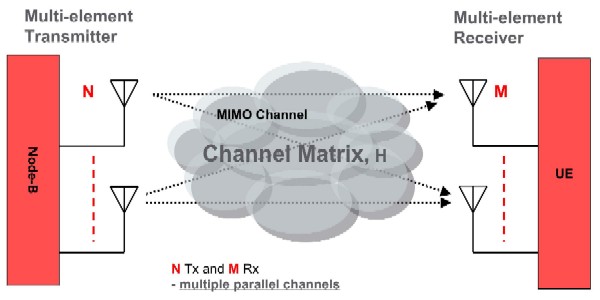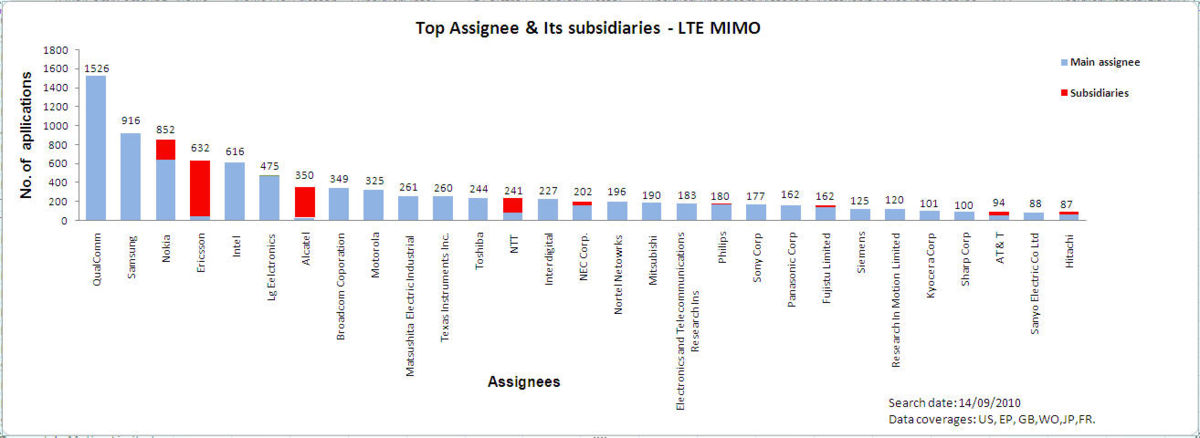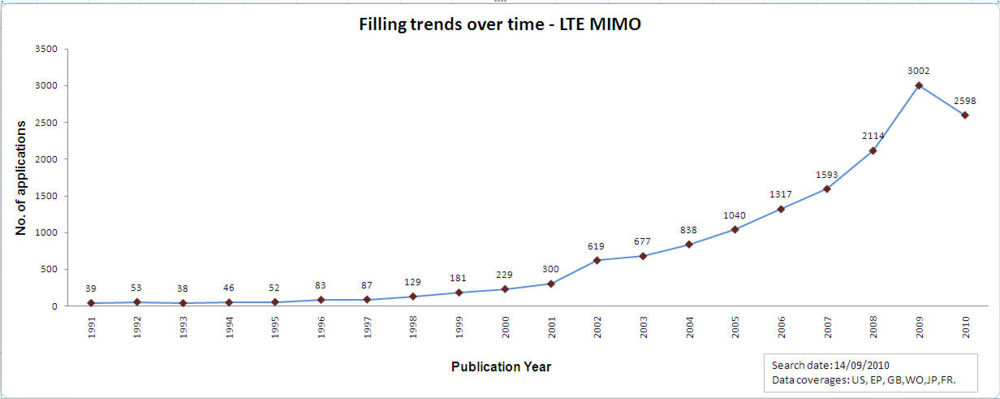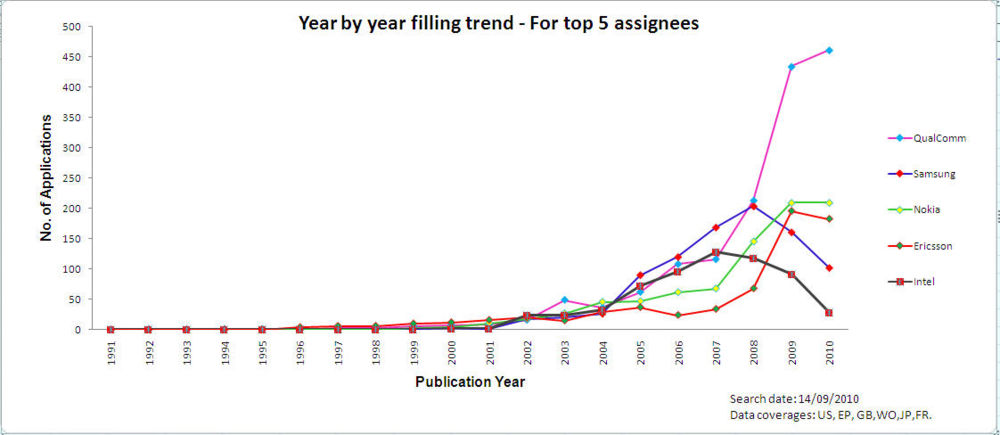LTE
Contents
- 1 Rationale
- 2 Background description
- 3 Technical details
- 4 LTE architecture
- 5 LTE enabling technologies
- 6 Taxonomy
- 7 MIMO(Multiple Input Multiple Output)
- 8 Concept table for MIMO
- 9 Control patents
- 10 Search strategy (Micropat)
- 11 Search strategy (Thomson Innovation)
- 12 Patent mapping by graphical analysis
- 13 Patent ranking
- 14 Company wise distribution of IP
- 15 Filing trends over the years
- 16 Filing trends for top 10 companies
- 17 Year by year trends of top 5 companies
- 18 References
Rationale
- LTE is the most suited technology as it provides higher data rates required for the future and is an advancement over widely used GSM/EDGE/HSPA
- A number of corporate giants are looking towards LTE as the technology enabling future communication
- The following factors are expected to be obtained with the realization of LTE
- Reduced cost per bit
- Increased service provisioning - more services at lower cost with better user experience
- Flexibility of use of existing and new frequency bands
- Simplified architecture, Open interfaces
- Allow for reasonable terminal power consumption
Background description
LTE (Long Term Evolution), is the latest standard in the mobile network technology that came into existence because of the growing needs of faster data rates. It is a 3rd Generation Partnership Project (3GPP), which realized this technology. LTE is an advancement to previously realized technologies such as GSM/EDGE and UMTS/HSxPA etc.Although LTE is often marketed as 4G, first-release LTE is actually a 3.9G technology since it does not fully comply with the IMT Advanced 4G requirements.
Update - LTE-Advanced has been granted 4G compliance given the significant improvement they provide over 3G technologies [1]
Voice traffic will be supported mainly as Voice over IP (VoIP) enabling better integration with other multimedia services.LTE is being designed to be a high data rate and low latency system. LTE is also aimed at minimizing cost and power consumption while ensuring backward-compatibility and a cost effective migration from UMTS systems. LTE tutorial
Technical details
Performance requirements
LTE is expected to support different types of services including web browsing, FTP, video streaming, VoIP, online gaming, real time video, push-to-talk and push-to-view. Therefore, it is being designed to be a high data rate and low latency system as indicated by the key performance criteria shown below.
LTE architecture
Protocol stack
Data flow
The data flow through protocol stack can be shown as
LTE frame structure
In order to maintain synchronization and manage different types of information exchange that need to be carried between the base-station or eNodeB and the User Equipment (UE), LTE system has a defined LTE frame and sub frame structure for the E-UTRA or Evolved UMTS Terrestrial Radio Access
There are two types of LTE frame structure:
- Type 1:used for the LTE FDD mode systems
- The basic type 1 LTE frame has an overall length of 10 ms. This is then divided into a total of 20 individual slots. LTE sub frames then consist of two slots - in other words there are ten LTE sub frames within a frame.
- Type 2:used for the LTE TDD systems
- The frame structure for the type 2 frames used on LTE TDD is somewhat different. The 10 ms frame comprises two half frames, each 5 ms long. The LTE half-frames are further split into five sub frames, each 1ms long.
- The subframes may be divided into standard sub frames of special sub frames. The special sub frames consist of three fields
- DwPTS - Downlink Pilot Time Slot
- GP - Guard Period
- UpPTS - Uplink Pilot Time Slot.
LTE enabling technologies
- OFDMA (Orthogonal Frequency Division Multiple Access)
- It is used in the downlink communication of LTE as it can support high data rates
- SC-FDMA (Single Carrier FDMA)
- It is used in the uplink communication of LTE as it helps in reducing terminal power consumption
- MIMO (Multi-Input Multi-Output)
- Helps in obtaining increased data rates with usage of many antennas.
- System Architecture Evolution(SAE)
- New core network architecture to support the high-throughput / low latency LTE access system
- Simplified network architecture
- All IP network
- All services are via PS domain only, No CS domain
- Support mobility between multiple heterogeneous access system
- Fractional frequency reuse
- Helps in reusing the frequency so that spectral efficiency can be improved
Taxonomy
MIMO(Multiple Input Multiple Output)
Multiple input multiple output (MIMO) technologies introduced in LTE such as spatial multiplexing, transmit diversity, and beamforming are key components for providing higher peak rate at a better system efficiency, which are essential for supporting future broadband data service over wireless links.In Long Term Evolution (LTE), MIMO technologies have been widely used to improve downlink peak rate, cell coverage, as well as average cell throughput.
To achieve this diverse set of objectives, LTE adopted various MIMO technologies including transmit diversity, single user (SU)-MIMO, multiuser (MU)-MIMO, closed-loop rank-1 precoding, and dedicated beamforming. MIMO in LTE
Concept table for MIMO
| S.no | MIMO | OFDMA | SCFDMA | Interference | SDMA | HARQ | Multipath | LTE | Others |
| 1 | Multiple adj input* adj multiple adj output* | OFDM | scfdma | interference near3 mitigate* | Space adj2 time adj2 transmit adj2 diversity | HARQ | Multipath near2 effect* | LTE | channel adj2 quality adj2 indication adj2 channel* |
| 2 | Distributed adj transmission adj directional adj reception | (orthogonal adj frequency adj division) near2 multiplex* | SINGLE adj CARRIER adj FREQUENCY adj DIVISION adj MULTIPLE adj ACCESS* | interference near3 cancel* | antenna adj2 multiplex* | Hybrid adj automatic adj repeat adj request | Multipath near2 propagat* | Long term evolution | CQICH |
| 3 | DTDR | ofdma | scfdm | interference near3 reduc* | SDMA | feedback adj2 mechani* | Multipath near2 phenomenon | Evolved packet system | Downlink adj2 Channel adj2 Descriptor adj2 message* |
| 4 | transmission adj2 diversit* | (orthogonal adj frequency adj division) near2 (multiple adj access) | single adj carrier adj frequency adj division adj multiplex* | interference near3 null* | Space adj2 division adj2 multiple adj2 access | Hybrid ARQ | System architecture evolution | adaptive adj2 modulation adj2 coding | |
| 5 | SFBC | discrete adj multi adj tone | SC-FDMA | Space adj2 domain adj2 multiple adj2 access | ARQ | E-UTRA* | pre adj coding*3 | ||
| 6 | Space adj2 frequency adj2 block adj coding | DMT | DFT-spread adj OFDM | plural* near2 (spatial adj streams | automatic adj repeat adj request | Evolved UMTS terrestrial radio access | per adj2 antenna adj2 rate adj2 control | ||
| 7 | SU adj2 MIMO | (adaptive ADJ modulation*) | DFT-S-OFDMA | spatial adj2 adaptation | Automatic Repeat Query | permutation adj2 mode adj2 selection | |||
| 8 | MU adj2 MIMO | sofdm | Interleaved adj FDMA | adaptive adj2 transmi* | |||||
| 9 | space adj2 time adj2 cod* | Interleaved adj Frequency adj Division adj Multiple adj Access | Bell adj2 Labs adj2 Layer adj2 Space adj2 Time | ||||||
| 10 | multiple adj antenna* | IFDMA | spatial adj2 multiplex* | ||||||
| 11 | multi adj antenna* | Discrete adj Fourier adj Transform adj Spread adj Orthogonal adj Frequency adj Multiple adj Access | |||||||
| 12 | multiple adj transmit* adj2 receive* | DFT- SOFDM | |||||||
| 13 | plural* adj2 antenna* | ||||||||
| 14 | atleast adj2 two adj2 antenna* | ||||||||
| 15 | layer adj map*4 | ||||||||
| 16 | beam adj2 steer* | ||||||||
| 17 | smart adj antenna*1 | ||||||||
| 18 | spatial adj multiplex*3 | ||||||||
| 19 | multiple adj transmit* adj antenna*1 | ||||||||
| 20 | multiple adj receive* adj antenna*1 | ||||||||
| 21 | Adaptive adj2 antenna adj2 steer* | ||||||||
| 22 | beam adj2 forming | ||||||||
| 23 | eigenmode adj2 multiplex* |
Control patents
| S.No | Patent/Publication No. | Title | Abstract |
| 1 | US7295624 | Wireless system with hybrid automatic retransmission request in interference-limited communications | A wireless receiver for receiving signals from an interference-limited transmitter in an interference-limited system comprising at least one transmit antenna, wherein the signals comprise a plurality of symbols. The receiver comprises a plurality of receive antennas and collection circuitry for collecting a plurality of signal samples with at least one symbol and interference effects. The receiver also comprises suppression circuitry, accumulation circuitry, circuitry for providing estimates of a group of bits, error detection circuitry and circuitry for requesting the transmitter to transmit a retransmission of a packet in response to detecting an error. |
| 2 | US6873606 | Rate adaptive transmission scheme for MIMO systems | A rate adaptive transmission scheme for MIMO systems, which can transmit a variable number of data symbol streams, provide transmit diversity for each data symbol stream, and fully utilize the total transmit power of the system and the full power of each antenna. In one method, at least one data symbol stream is received for transmission from a plurality of antennas. Each data symbol stream is scaled with a respective weight corresponding to the amount of transmit power allocated to that stream. The scaled data symbol stream(s) are multiplied with a transmit basis matrix to provide a plurality of transmit symbol streams for the plurality of antennas. The transmit basis matrix (e.g., a Walsh-Hadamard matrix or a DFT matrix) is defined such that each data symbol stream is transmitted from all antennas and each transmit symbol stream is transmitted at (or near) the full power for the associated antenna. |
| 3 | US7233625 | Preamble design for multiple input--multiple output (MIMO), orthogonal frequency division multiplexing (OFDM) system | One or more preambles are inserted into frames of Orthogonal Frequency Multiplexing (OFDM)-Multiple Input, Multiple Output (MIMO) signals. The preamble is received by the antennas of a receiver, decoded and compared to known values to provide synchronization, framing, channels estimation, offsets and other corrections to the transmitted signal. |
| 4 | US7248559 | Scattered pilot pattern and channel estimation method for MIMO-OFDM systems | A method and apparatus are provided for reducing the number of pilot symbols within a MIMO-OFDM communication system, and for improving channel estimation within such a system. For each transmitting antenna in an OFDM transmitter, pilot symbols are encoded so as to be unique to the transmitting antenna. The encoded pilot symbols are then inserted into an OFDM frame to form a diamond lattice, the diamond lattices for the different transmitting antennae using the same frequencies but being offset from each other by a single symbol in the time domain. At the OFDM receiver, a channel response is estimated for a symbol central to each diamond of the diamond lattice using a two-dimensional interpolation. The estimated channel responses are smoothed in the frequency domain. The channel responses of remaining symbols are then estimated by interpolation in the frequency domain. |
| 5 | US7548506 | System access and synchronization methods for MIMO OFDM communications systems and physical layer packet and preamble design | A method and apparatus are provided for performing acquisition, synchronization and cell selection within an MIMO-OFDM communication system. A coarse synchronization is performed to determine a searching window. A fine synchronization is then performed by measuring correlations between subsets of signal samples, whose first signal sample lies within the searching window, and known values. The correlations are performed in the frequency domain of the received signal. In a multiple-output OFDM system, each antenna of the OFDM transmitter has a unique known value. The known value is transmitted as pairs of consecutive pilot symbols, each pair of pilot symbols being transmitted at the same subset of sub-carrier frequencies within the OFDM frame. |
| 6 | US7120395 | MIMO communications | The present invention allows a wireless communication system, such as a base station, to select N antennas from an associated group of M antennas for transmitting multiple streams of data to a given user. Based on the channel conditions between the M antennas of the wireless communication system and the multiple antennas at the receiver, the N antennas to use for transmission are selected to enhance channel capacity, signal-to-noise ratios, or a combination thereof. The channel conditions are measured at the receiver, and may be sent back to the wireless communication system for processing or may be processed at the receiver, wherein instructions are transmitted back to the wireless communication system to control antenna selection. |
| 7 | US7283499 | Simplified practical rank and mechanism, and associated method, to adapt MIMO modulation in a multi-carrier system with feedback | A method of adapting transmission parameters in a multicarrier communication system having multiple transmit antennas and/or multiple receive antennas, whereby a statistical parameter of a wideband channel is computed, one type of matrix modulation scheme is selected to be used for a given multicarrier modulation symbol, one type of signal constellation is selected to be used for a given multicarrier modulation symbol, and one concatenated channel coding rate is selected to be used for a given multicarrier modulation symbol. Multicarrier modulation symbols are then transmitted using the selected matrix modulation scheme, signal constellation, and concatenated channel coding rate. |
| 8 | US7194040 | Beam-steering and beam-forming for wideband MIMO/MISO systems | Techniques to perform beam-steering and beam-forming to transmit data on a single eigenmode in a wideband multiple-input channel. In one method, a steering vector is obtained for each of a number of subbands. Depending on how the steering vectors are defined, beam-steering or beam-forming can be achieved for each subband. The total transmit power is allocated to the subbands based on a particular power allocation scheme (e.g., full channel inversion, selective channel inversion, water-filling, or uniform). A scaling value is then obtained for each subband based on its allocated transmit power. Data to be transmitted is coded and modulated to provide modulation symbols. The modulation symbols to be transmitted on each subband are scaled with the subband’s scaling value and further preconditioned with the subband’s steering vector. A stream of preconditioned symbols is then formed for each transmit antenna. |
| 9 | US7336727 | Generalized m-rank beamformers for MIMO systems using successive quantization | The telecommunications system described herein implements a multi-rank beamformer for use in wireless systems equipped with multiple transmit and multiple receive antennas. The multi-rank beamformer uses finite-rate feedback of channel conditions to achieves close to theoretical performance indicated by the water-filling algorithm, while avoiding the computational complexity associated with space time codes. In addition, the multi-rank beamforming system described herein improves on the performance of unit rank beamforming methods by maintaining the gains over space time codes over a broader range of transmission rate |
| 10 | US7702029 | MIMO precoding enabling spatial multiplexing, power allocation and adaptive modulation and coding | In a closed-loop wireless communication system, a codebook-based feedback mechanism is provided to enable non-unitary precoding for multi-stream transmission, where in each stream is optimized with suitable transmission power allocation and AMC. The codebook-based feedback mechanism uses a precoding codebook having a power allocation matrix which is constrained to specify that beamforming always applies full power to a predetermined beam. With this constraint, a one-bit power allocation feedback index may be used to switch between beamforming and spatial multiplexing. |
| 11 | US20080247479 | Pilot Scheme For A Mimo Communication System | The present invention employs a pilot scheme for frequency division multiple access (FDM) communication systems, such as single carrier FDM communication systems. A given transmit time interval will include numerous traffic symbols and two or more short pilot symbols, which are spaced apart from one another by at least one traffic symbol and will have a Fourier transform length that is less than the Fourier transform length of any given traffic symbol. Multiple transmitters will generate pilot information and modulate the pilot information onto sub-carriers of the short pilot symbols in an orthogonal manner. Each transmitter may use different sub-carriers within the time and frequency domain, which is encompassed by the short pilot symbols within the transmit time interval. Alternatively, each transmitter may uniquely encode the pilot information using a unique code division multiplexed code and modulate the encoded pilot information onto common sub-carriers of the short pilot symbols. |
| 12 | US7630356 | Methods for supporting MIMO transmission in OFDM applications | Aspects of the present invention provide MAC enhancements to support the PHY features of a MIMO-OFDMA framework. The MAC enhancements involve DL burst assignment to support adaptive MIMO transmission, UL burst assignment to support adaptive MIMO transmission, fast feedback channel operation to support wireless terminal dynamic feedback of MIMO mode selection, for example space time transmit diversity (STTD) or spatial multiplexing (SM), and/or permutation mode selection, for example diversity or adjacent subcarrier mode, dynamic CQICH allocation and de-allocation and the use of CQICH_ID for DL burst allocation. One or more of these enhancements is included in a given implementation. Methods are also provided for implementing the MAC enhancements. |
| 13 | US20080165875 | Multi-user MIMO-SDMA for finite rate feedback systems | A multi-user MIMO downlink beamforming system with limited feedback is provided to enable preceding for multi-stream transmission, where a channel codeword (u.sub.i) and one or more channel quality indicator values (CQI.sub.A, CQI.sub.B) are computed at the user equipment on the basis of maximizing a predetermined SINR performance metric (.rho..sub.i) which estimates the receive signal-to-noise-ratio (SINR) at the user equipment . The computed codeword (u.sub.i) and CQI values (or differential values related thereto) are quantized and fed back to help the base station which applies a correction to the appropriate CQI value in the course of designing the transmit beamforming vectors w and determining the appropriate modulation and coding level to be used for downlink data transmission. |
| 14 | US20100142455 | Systems and methods for uplink power control | A method for uplink power control is described. A user equipment (UE) power class may be determined. An uplink multiple access scheme may also be determined. The maximum transmission power for the UE may further be determined according to the determined uplink multiple access scheme and the UE power class. |
| 15 | US20040082356 | MIMO WLAN system | A multiple-access MIMO WLAN system that employs MIMO, OFDM, and TDD. The system uses a channel structure with a number of configurable transport channels, supports multiple rates and transmission modes, which are configurable based on channel conditions and user terminal capabilities, employs a pilot structure with several types of pilot (e.g., beacon, MIMO, steered reference, and carrier pilots) for different functions, implements rate, timing, and power control loops for proper system operation, and employs random access for system access by the user terminals, fast acknowledgment, and quick resource assignments. Calibration may be performed to account for differences in the frequency responses of transmit/receive chains at the access point and user terminals. The spatial processing may then be simplified by taking advantage of the reciprocal nature of the downlink and uplink and the calibration. |
| 16 | US20090046800 | Feedback and rate adaptation for MIMO transmission in a Time Division Duplexed (TDD) communication system | Techniques for sending a MIMO transmission in a wireless communication system are described. In one design, a transmitter sends a first reference signal to a receiver. The receiver selects a precoding matrix based on the first reference signal and in accordance with a selection criterion. The receiver estimates noise and interference at the receiver and determines channel quality indicator (CQI) or modulation and coding scheme (MCS) information based on the precoding matrix and the estimated noise and interference. The receiver sends the CQI or MCS information and a second reference signal to the transmitter. The transmitter selects the precoding matrix based on the second reference signal and in accordance with the same selection criterion used by the receiver. The transmitter then sends a MIMO transmission to the receiver based on the CQI or MCS information obtained from the receiver and the precoding matrix selected by the transmitter. |
| 17 | US20080188259 | CQI reporting for MIMO transmissionin a wireless communication system | Techniques for determining and reporting channel quality indicator (CQI) information are described. A user equipment (UE) may determine a transmit power per channelization code, P.sub.OVSF, based on the available transmit power and a designated number of channelization codes, e.g., by uniformly distributing the available transmit power across all transport blocks and all of the designated number of channelization codes. The UE may estimate SINRs of multiple transport blocks based on P.sub.OVSF, determine CQI indices for the transport blocks based on the SINRs, and send the CQI indices to a Node B. The Node B may send multiple transport blocks to the UE based on the CQI indices. The Node B may send the transport blocks (i) with the designated number of channelization codes at P.sub.OVSF or (ii) with a second number of channelization codes at P.sub.OVSF, with the transport block sizes being scaled based on the designated and second numbers of channelization codes. |
| 18 | US20090086849 | Method and apparatus of improved circular buffer rate matching for turbo-coded MIMO-OFDM wireless systems | Methods and apparatus for determining the starting points of redundancy version transmissions in a circular rate matching operation. At least one block of information bits to be transmitted are encoded to generate a plurality of coded bits, which are then segmented into a plurality of sub-blocks of coded bits. Each of the sub-blocks of coded bits is interleaved by using a certain interleaver. The interleaved coded bits of the plurality of sub-blocks are collected and filled into a circular buffer having a plurality of redundancy versions in the circular buffer, with each redundancy version corresponding to a starting bit index in the circular buffer. For each transmission, a subset of bits are selected from the circular buffer by selecting a redundancy version from among the plurality of redundancy version. The selected subset of bits are modulated by using a certain modulation scheme, and are transmitted via at least one antenna. The redundancy versions of the circular being determined such that in at least one pair of redundancy versions, the number of bits between the starting point of a first redundancy version and the starting point of a second redundancy version is not divisible by at least one modulation order. |
| 19 | US20060045169 | Coded-bit scrambling for multi-stream communication in a mimo channel | In one embodiment, a multi-input/multi-output system includes a receiver , processor, coded bit scrambler, coded bit descrambler , and transmitter . The receiver generates demodulated symbol streams corresponding to a received signal. The processor generates coded bit sequences from source bit streams when operating in a transmit mode and bit log-likelihood ratio sequences from the information bit streams when operating in a receive mode. The coded bit scrambler scrambles the coded bit sequences to generate scrambled bit streams when in the transmit mode. The coded bit descrambler descrambles the log-likelihood ratio sequences by a real-valued descrambling sequence when operating in the receive mode, and also removes the effect of a scrambling sequence. The transmitter generates a transmit signal corresponding to the scrambled bit streams. |
| 20 | US20070105503 | Systems and methods for reducing uplink resources to provide channel performance feedback for adjustment of downlink MIMO channel data rates | Systems and methods for improving the performance of a MIMO wireless communication system by reducing the amount of uplink resources that are needed to provide channel performance feedback for the adjustment of data rates on the downlink MIMO channels. In one embodiment, a method comprises encoding each of a set of data streams according to corresponding data rates, permuting the data streams on a set of MIMO channels according to a full permutation of combinations, transmitting the permuted data streams, receiving the permuted data streams, decoding and determining an SNR for each of the data streams, computing a condensed SNR metric for the set of data streams, providing the condensed metric as feedback, determining a set of individual SNR metrics for the data streams based on the condensed SNR metric, and adjusting the data rates at which the data streams are encoded based on the individual SNR metrics. |
Search strategy (Micropat)
| S.no | Scope | Timeline | Databases | Concept | Query | No of hits |
| 1 | Full spec | 1836-date | USG USA EPA EPB WO JP DEG DEA DET DEU GBA FRA | MIMO | (MIMO OR (Multiple adj input* adj multiple adj output*) OR (Distributed adj transmission adj directional adj reception) OR (transmission adj2 diversit*) OR (Space adj2 frequency adj2 block adj cod*3) OR (SU adj2 MIMO) OR (MU adj2 MIMO) OR (space adj2 time adj2 cod*) OR (multiple adj antenna*) OR (multi adj antenna*) OR (multiple adj transmit* adj2 receive*) OR (plural* adj2 antenna*) OR (atleast adj2 two adj2 antenna*) OR (layer adj map*4) OR (beam adj2 steer*) OR (smart adj antenna*1) OR (spatial adj multiplex*3) OR (multiple adj transmit* adj antenna*1) OR (multiple adj receive* adj antenna*1) OR (Adaptive adj2 antenna adj2 steer*) OR (beam adj2 forming) OR (eigenmode adj2 multiplex*)) | 112290 hits |
| 2 | Full spec | 1836-date | USG USA EPA EPB WO JP DEG DEA DET DEU GBA FRA | OFDMA | OFDM or ((orthogonal adj frequency adj division) near2 multiplex*) or ofdma or ((orthogonal adj frequency adj division ) near2 (multiple adj access)) or SOFDM or (discrete ADJ multi ADJ tone) or (adaptive ADJ modulation*) | 66762 hits |
| 3 | Full spec | 1836-date | USG USA EPA EPB WO JP DEG DEA DET DEU GBA FRA | SCFDMA | scfdma or (SINGLE adj CARRIER adj FREQUENCY adj DIVISION adj MULTIPLE adj ACCESS*) or scfdm or (single adj carrier adj frequency adj division adj multiplex*) or ("SC-FDMA") or (DFT-spread adj OFDM) or ("DFT-S-OFDMA ") or (Interleaved adj FDMA ) or (Interleaved adj Frequency adj Division adj Multiple adj Access ) or ("IFDMA" ) or (" Discrete adj Fourier adj Transform adj Spread adj Orthogonal adj Frequency adj Multiple adj Access ") or (" DFT- SOFDM ") | 5701 hits |
| 4 | Full spec | 1836-date | USG USA EPA EPB WO JP DEG DEA DET DEU GBA FRA | Interference | (interference near3 mitigate*) or (interference near3 cancel* ) or (interference near3 reduc*) or (interference near3 null* ) | 93407 hits |
| 5 | Full spec | 1836-date | USG USA EPA EPB WO JP DEG DEA DET DEU GBA FRA | SDMA | (Space adj2 time adj2 transmit adj2 diversity) or (antenna adj2 multiplex*) or SDMA or (Space adj2 division adj2 multiple adj2 access) or (Space adj2 domain adj2 multiple adj2 access) or (plural* near2 (spatial adj streams)) or (spatial adj2 adaptation) or (adaptive adj2 transmi*) or (Bell adj2 Labs adj2 Layer adj2 Space adj2 Time) or (spatial adj2 multiplex*) | 14886 hits |
| 6 | Full spec | 1836-date | USG USA EPA EPB WO JP DEG DEA DET DEU GBA FRA | HARQ | HARQ or (Hybrid adj automatic adj repeat adj request) or (Hybrid adj2 ARQ) or (ARQ ) or (automatic adj repeat adj request ) or (Automatic adj Repeat adj Query ) or (feedback adj2 mechani*) | 54419 hits |
| 7 | Full spec | 1836-date | USG USA EPA EPB WO JP DEG DEA DET DEU GBA FRA | Multipath | Multipath near2 (effect* or propagati* or phenomenon) or interference near3 (mitigate* or reduc* or cancel* or null*) | 103119 hits |
| 8 | Full spec | 1836-date | USG USA EPA EPB WO JP DEG DEA DET DEU GBA FRA | LTE Synonyms | (LTE OR (long ADJ term ADJ evolution) OR (evolved ADJ packet ADJ system) OR (system ADJ architecture ADJ evolution) OR (E ADJ UTRA*) OR EUTRA*1 OR (evolved ADJ UMTS ADJ terrestrial ADJ radio ADJ access)) | 29270 hits |
| 9 | Full spec | 1836-date | USG USA EPA EPB WO JP DEG DEA DET DEU GBA FRA | Others | (channel adj2 quality adj2 indicat*3 adj2 channel* ) or (CQICH) or (Downlink adj2 Channel adj2 Descriptor adj2 message* ) or (adaptive adj2 modulation adj2 coding ) or (pre adj coding*3 ) or (per adj2 antenna adj2 rate adj2 control ) or (permutation adj2 mode adj2 selection ) | 8917 hits |
| 10 | Combined Query | 2 or 3 or 4 or 5 or 6 or 7 or 8 or 9 | 225024 hits | |||
| 11 | Combined Query | 1 and 10 | 35704 hits | |||
| 12 | Final result in Full spec | No of unique records | 15233 Relevancy = 45% | |||
| 13 | IPC and ECLA class | 1836-date | USG USA EPA EPB WO JP DEG DEA DET DEU GBA FRA | MIMO | H04B0007* OR H04L000102 OR H04L000106 OR H01Q0001* OR H01Q0003* OR H01Q0005* OR H01Q0021* OR H01Q0025* OR H01Q0009* OR H04B000702M OR H04B000704B OR H04B000704M OR H04B000704M3B OR H04B000704M3M OR H04B000704M5 OR H04B000704S OR H04B000706B OR H04B000706B1 OR H04B000706B1R OR H04B000706B2 OR H04B000706B2F OR H04B000706C OR H04B000706C1 OR H04B000706C1B OR H04B000706C1D OR H04B000706C1F3C OR H04B000706C1F5R OR H04B000706C1F5T OR H04B000706C2 OR H04B000706C2C OR H04B000706C2D OR H04B000706C3 OR H04B000706C4 OR H04B000706H OR H04B000706H1 OR H04B000706H2 OR H04B000706H3 OR H04B000706M OR H04B000708B OR H04B000708B2 OR H04B000708B2C OR H04B000708B2R OR H04B000708B4* OR H04B000708C OR H04B000708H* OR H04B000708P* OR H04B000708S* OR H04L000100B7* OR H04L000100B7B1 OR H04L000106F* | 330557 hits |
| 14 | IPC and ECLA class | 1836-date | USG USA EPA EPB WO JP DEG DEA DET DEU GBA FRA | OFDMA | H04J000104 OR H03D0000100 OR H04B0007204 OR H04B0007208 OR H04J000105 OR H04J000900 OR H04J001100 OR H04J001100 OR H04J001318 OR H04K000100 OR H04L000500 OR H04L002500 OR H04W007200 OR H04L000500A2A1 OR H04B000706C1F7C OR H04B0007204B OR H04B0007204D OR H04L000106T7A OR H04L000500A OR H04L000500A2A1 OR H04L0027227A3 | 84933 hits |
| 15 | IPC and ECLA class | 1836-date | USG USA EPA EPB WO JP DEG DEA DET DEU GBA FRA | SCFDMA | H04J000100 OR H03D0000100 OR H04B0007204 OR H04B0007208 OR H04J000900 OR H04K000100 OR H04L000500 OR H04L002500 OR H04W007200 OR H04L002736A OR H04B000706C1F7C OR H04B0007204B OR H04B0007204D OR H04L000106T7A OR H04L000500A OR H04L000500A2A1 OR H04L000500A2A1 OR H04L002720D1 OR H04L0027227A3 | 79709 hits |
| 16 | IPC and ECLA class | 1836-date | USG USA EPA EPB WO JP DEG DEA DET DEU GBA FRA | Interference | H04B001500 OR H04B00110 OR H04B001500 OR H04W005202 OR H04W007204 OR H04W009200 OR H04W007208B OR H04B000169U7 OR H04L002503B OR H04L000100B5E3 OR H04W005202E6 | 42592 hits |
| 17 | IPC and ECLA class | 1836-date | USG USA EPA EPB WO JP DEG DEA DET DEU GBA FRA | SDMA | H04L000106 OR H04L000106T* OR H04L000106T7K | 8715 hits |
| 18 | IPC and ECLA class | 1836-date | USG USA EPA EPB WO JP DEG DEA DET DEU GBA FRA | HARQ | H04L000118 OR H04L000118C OR H04L000118D* OR H04L000118H OR H04L000118P OR H04L000100B | 16574 hits |
| 19 | IPC and ECLA class | 1836-date | USG USA EPA EPB WO JP DEG DEA DET DEU GBA FRA | Multipath | H04B000702 OR G01S001922 OR H04B000110 OR H04B000702 OR H04W005224 OR H04W007208 OR H04B000110M OR H04W007208B OR G01S000100S1A3 OR G01S000100S2C4 OR G01S001344C OR H04W005224J | 46753 hits |
| 20 | IPC and ECLA class | 1836-date | USG USA EPA EPB WO JP DEG DEA DET DEU GBA FRA | LTE Synonyms | H04L001256 OR H04L001240F3 OR H04L001256C | 163607 hits |
| 21 | Claims | 1836-date | USG USA EPA EPB WO JP DEG DEA DET DEU GBA FRA | MIMO | (MIMO OR (Multiple adj input* adj multiple adj output*) OR (Distributed adj transmission adj directional adj reception) OR (transmission adj2 diversit*) OR (Space adj2 frequency adj2 block adj cod*3) OR (SU adj2 MIMO) OR (MU adj2 MIMO) OR (space adj2 time adj2 cod*) OR (multiple adj antenna*) OR (multi adj antenna*) OR (multiple adj transmit* adj2 receive*) OR (plural* adj2 antenna*) OR (atleast adj2 two adj2 antenna*) OR (layer adj map*4) OR (beam adj2 steer*) OR (smart adj antenna*1) OR (spatial adj multiplex*3) OR (multiple adj transmit* adj antenna*1) OR (multiple adj receive* adj antenna*1) OR (Adaptive adj2 antenna adj2 steer*) OR (beam adj2 forming) OR (eigenmode adj2 multiplex*)) | 31273 hits |
| 22 | Claims | 1836-date | USG USA EPA EPB WO JP DEG DEA DET DEU GBA FRA | OFDMA | OFDM or ((orthogonal adj frequency adj division) near2 multiplex*) or ofdma or ((orthogonal adj frequency adj division ) near2 (multiple adj access)) or SOFDM or (discrete ADJ multi ADJ tone) or (adaptive ADJ modulation*) | 16525 hits |
| 23 | Claims | 1836-date | USG USA EPA EPB WO JP DEG DEA DET DEU GBA FRA | SCFDMA | scfdma or (SINGLE adj CARRIER adj FREQUENCY adj DIVISION adj MULTIPLE adj ACCESS*) or scfdm or (single adj carrier adj frequency adj division adj multiplex*) or ("SC-FDMA") or (DFT-spread adj OFDM) or ("DFT-S-OFDMA ") or (Interleaved adj FDMA ) or (Interleaved adj Frequency adj Division adj Multiple adj Access ) or ("IFDMA" ) or (" Discrete adj Fourier adj Transform adj Spread adj Orthogonal adj Frequency adj Multiple adj Access ") or (" DFT- SOFDM ") | 482 hits |
| 24 | Claims | 1836-date | USG USA EPA EPB WO JP DEG DEA DET DEU GBA FRA | Interference | (interference near3 mitigate*) or (interference near3 cancel* ) or (interference near3 reduc*) or (interference near3 null* ) | 9937 hits |
| 25 | Claims | 1836-date | USG USA EPA EPB WO JP DEG DEA DET DEU GBA FRA | SDMA | (Space adj2 time adj2 transmit adj2 diversity) or (antenna adj2 multiplex*) or SDMA or (Space adj2 division adj2 multiple adj2 access) or (Space adj2 domain adj2 multiple adj2 access) or (plural* near2 (spatial adj streams)) or (spatial adj2 adaptation) or (adaptive adj2 transmi*) or (Bell adj2 Labs adj2 Layer adj2 Space adj2 Time) or (spatial adj2 multiplex*) | 2096 hits |
| 26 | Claims | 1836-date | USG USA EPA EPB WO JP DEG DEA DET DEU GBA FRA | HARQ | HARQ or (Hybrid adj automatic adj repeat adj request) or (Hybrid adj2 ARQ) or (ARQ ) or (automatic adj repeat adj request ) or (Automatic adj Repeat adj Query ) or (feedback adj2 mechani*) | 6601 hits |
| 27 | Claims | 1836-date | USG USA EPA EPB WO JP DEG DEA DET DEU GBA FRA | Multipath | Multipath near2 (effect* or propagati* or phenomenon) or interference near3 (mitigate* or reduc* or cancel* or null*) | 10409 hits |
| 28 | Claims | 1836-date | USG USA EPA EPB WO JP DEG DEA DET DEU GBA FRA | LTE Synonyms | (LTE OR (long ADJ term ADJ evolution) OR (evolved ADJ packet ADJ system) OR (system ADJ architecture ADJ evolution) OR (E ADJ UTRA*) OR EUTRA*1 OR (evolved ADJ UMTS ADJ terrestrial ADJ radio ADJ access)) | 3584 hits |
| 29 | Claims | 1836-date | USG USA EPA EPB WO JP DEG DEA DET DEU GBA FRA | Others | (channel adj2 quality adj2 indicat*3 adj2 channel* ) or (CQICH) or (Downlink adj2 Channel adj2 Descriptor adj2 message* ) or (adaptive adj2 modulation adj2 coding ) or (pre adj coding*3 ) or (per adj2 antenna adj2 rate adj2 control ) or (permutation adj2 mode adj2 selection ) | 1236 hits |
| 30 | Combined Query | 22 or 23 or 24 or 25 or 26 or 27 or 28 or 29 | 37953 hits | |||
| 31 | Combined Query | 21 and 30 | 4760 hits | |||
| 32 | MIMO with OFDMA | (21 and 13) and (22 or 14) | 2994 hits | |||
| 33 | MIMO with SCFDMA | (21 and 13) and (23 or 15) | 1219 hits | |||
| 34 | MIMO with Interference | (21 and 13) and (24 or 16) | 1178 hits | |||
| 35 | MIMO with SDMA | (21 and 13) and (25 or 17) | 3033 hits | |||
| 36 | MIMO with HARQ | (21 and 13) and (26 or 18) | 365 hits | |||
| 37 | MIMO with Multipath | (21 and 13) and (27 or 19) | 3433 hits | |||
| 38 | MIMO with LTE Synonyms | (21 and 13) and (28 or 20) | 462 hits | |||
| 39 | MIMO with Others | (21 and 13) and 29 | 259 hits | |||
| 40 | Combined query | 32 or 33 or 34 or 35 or 36 or 37 or 38 or 39 | 7288 hits | |||
| 41 | Combined query | 40 Not 11 | 1393 hits | |||
| 42 | No of unique records of Query 41 | 761 | ||||
| 43 | Final Query | 12 or 42 | 15994 Relevancy = 44% | |||
Disclaimer: As there is a restriction of 20000 patents in micropat for creating the worksheet. The patents were divided into two groups based on the earliest priority date and then reduced to a single member family. Therefore there could be some patent family overlap.
Search strategy (Thomson Innovation)
| S.no | Scope | Timeline | Databases | Concept | Query | No of hits |
| 1 | Full spec | 1836-date | USG USA EPA EPB WO DEG DEA DET DEU GBA FRA Japanese Utility Models, Japanese Granted, Japanese Applications, Chinese Utility Models, Chinese Applications, Korean Utility Models, Korean Granted/Examined, Korean Applications | MIMO | (MIMO OR (Multiple adj input* adj multiple adj output*) OR (Distributed adj transmission adj directional adj reception) OR (transmission adj2 diversit*) OR (Space adj2 frequency adj2 block adj cod*3) OR (SU adj2 MIMO) OR (MU adj2 MIMO) OR (space adj2 time adj2 cod*) OR (multiple adj antenna*) OR (multi adj antenna*) OR (multiple adj transmit* adj2 receive*) OR (plural* adj2 antenna*) OR (atleast adj2 two adj2 antenna*) OR (layer adj map*4) OR (beam adj2 steer*) OR (smart adj antenna*1) OR (spatial adj multiplex*3) OR (multiple adj transmit* adj antenna*1) OR (multiple adj receive* adj antenna*1) OR (Adaptive adj2 antenna adj2 steer*) OR (beam adj2 forming) OR (eigenmode adj2 multiplex*)) | 156834 hits |
| 2 | Full spec | 1836-date | USG USA EPA EPB WO DEG DEA DET DEU GBA FRA Japanese Utility Models, Japanese Granted, Japanese Applications, Chinese Utility Models, Chinese Applications, Korean Utility Models, Korean Granted/Examined, Korean Applications | OFDMA | OFDM or ((orthogonal adj frequency adj division) near2 multiplex*) or ofdma or ((orthogonal adj frequency adj division ) near2 (multiple adj access)) or SOFDM or (discrete ADJ multi ADJ tone) or (adaptive ADJ modulation*) | 115047 hits |
| 3 | Full spec | 1836-date | USG USA EPA EPB WO DEG DEA DET DEU GBA FRA Japanese Utility Models, Japanese Granted, Japanese Applications, Chinese Utility Models, Chinese Applications, Korean Utility Models, Korean Granted/Examined, Korean Applications | SCFDMA | scfdma or (SINGLE adj CARRIER adj FREQUENCY adj DIVISION adj MULTIPLE adj ACCESS*) or scfdm or (single adj carrier adj frequency adj division adj multiplex*) or (SC-FDMA) or (DFT-spread adj OFDM) or (DFT-S-OFDMA ) or (Interleaved adj FDMA ) or (Interleaved adj Frequency adj Division adj Multiple adj Access ) or (IFDMA) or (Discrete adj Fourier adj Transform adj Spread adj Orthogonal adj Frequency adj Multiple adj Access) or (DFT- SOFDM) | 9897 hits |
| 4 | Full spec | 1836-date | USG USA EPA EPB WO DEG DEA DET DEU GBA FRA Japanese Utility Models, Japanese Granted, Japanese Applications, Chinese Utility Models, Chinese Applications, Korean Utility Models, Korean Granted/Examined, Korean Applications | Interference | (interference near3 mitigate*) or (interference near3 cancel* ) or (interference near3 reduc*) or (interference near3 null* ) | 139479 hits |
| 5 | Full spec | 1836-date | USG USA EPA EPB WO DEG DEA DET DEU GBA FRA Japanese Utility Models, Japanese Granted, Japanese Applications, Chinese Utility Models, Chinese Applications, Korean Utility Models, Korean Granted/Examined, Korean Applications | SDMA | (Space adj2 time adj2 transmit adj2 diversity) or (antenna adj2 multiplex*) or SDMA or (Space adj2 division adj2 multiple adj2 access) or (Space adj2 domain adj2 multiple adj2 access) or (plural* near2 (spatial adj streams)) or (spatial adj2 adaptation) or (adaptive adj2 transmi*) or (Bell adj2 Labs adj2 Layer adj2 Space adj2 Time) or (spatial adj2 multiplex*) | 21381 hits |
| 6 | Full spec | 1836-date | USG USA EPA EPB WO DEG DEA DET DEU GBA FRA Japanese Utility Models, Japanese Granted, Japanese Applications, Chinese Utility Models, Chinese Applications, Korean Utility Models, Korean Granted/Examined, Korean Applications | HARQ | HARQ or (Hybrid adj automatic adj repeat adj request) or (Hybrid adj2 ARQ) or (ARQ ) or (automatic adj repeat adj request ) or (Automatic adj Repeat adj Query ) or (feedback adj2 mechani*) | 68710 hits |
| 7 | Full spec | 1836-date | USG USA EPA EPB WO DEG DEA DET DEU GBA FRA Japanese Utility Models, Japanese Granted, Japanese Applications, Chinese Utility Models, Chinese Applications, Korean Utility Models, Korean Granted/Examined, Korean Applications | Multipath | Multipath near2 (effect* or propagati* or phenomenon) or interference near3 (mitigate* or reduc* or cancel* or null*) | 151714 hits |
| 8 | Full spec | 1836-date | USG USA EPA EPB WO DEG DEA DET DEU GBA FRA Japanese Utility Models, Japanese Granted, Japanese Applications, Chinese Utility Models, Chinese Applications, Korean Utility Models, Korean Granted/Examined, Korean Applications | LTE Synonyms | (LTE OR (long ADJ term ADJ evolution) OR (evolved ADJ packet ADJ system) OR (system ADJ architecture ADJ evolution) OR (E ADJ UTRA*) OR EUTRA*1 OR (evolved ADJ UMTS ADJ terrestrial ADJ radio ADJ access)) | 40642 hits |
| 9 | Full spec | 1836-date | USG USA EPA EPB WO DEG DEA DET DEU GBA FRA Japanese Utility Models, Japanese Granted, Japanese Applications, Chinese Utility Models, Chinese Applications, Korean Utility Models, Korean Granted/Examined, Korean Applications | Others | (channel adj2 quality adj2 indicat*3 adj2 channel* ) or (CQICH) or (Downlink adj2 Channel adj2 Descriptor adj2 message* ) or (adaptive adj2 modulation adj2 coding ) or (pre adj coding*3 ) or (per adj2 antenna adj2 rate adj2 control ) or (permutation adj2 mode adj2 selection ) | 13853 hits |
| 10 | Combined Query | 2 or 3 or 4 or 5 or 6 or 7 or 8 or 9 | 336636 hits | |||
| 11 | Combined Query | 1 and 10 | 50421 hits | |||
| 12 | Final result in Full spec | No of unique INPADOC families | 12684 Relevancy = 46% | |||
| 13 | IPC and ECLA class | 1836-date | USG USA EPA EPB WO DEG DEA DET DEU GBA FRA Japanese Utility Models, Japanese Granted, Japanese Applications, Chinese Utility Models, Chinese Applications, Korean Utility Models, Korean Granted/Examined, Korean Applications | MIMO | H04B0007* OR H04L000102 OR H04L000106 OR H01Q0001* OR H01Q0003* OR H01Q0005* OR H01Q0021* OR H01Q0025* OR H01Q0009* OR H04B000702M OR H04B000704B OR H04B000704M OR H04B000704M3B OR H04B000704M3M OR H04B000704M5 OR H04B000704S OR H04B000706B OR H04B000706B1 OR H04B000706B1R OR H04B000706B2 OR H04B000706B2F OR H04B000706C OR H04B000706C1 OR H04B000706C1B OR H04B000706C1D OR H04B000706C1F3C OR H04B000706C1F5R OR H04B000706C1F5T OR H04B000706C2 OR H04B000706C2C OR H04B000706C2D OR H04B000706C3 OR H04B000706C4 OR H04B000706H OR H04B000706H1 OR H04B000706H2 OR H04B000706H3 OR H04B000706M OR H04B000708B OR H04B000708B2 OR H04B000708B2C OR H04B000708B2R OR H04B000708B4* OR H04B000708C OR H04B000708H* OR H04B000708P* OR H04B000708S* OR H04L000100B7* OR H04L000100B7B1 OR H04L000106F* | 770144 hits |
| 14 | IPC and ECLA class | 1836-date | USG USA EPA EPB WO DEG DEA DET DEU GBA FRA Japanese Utility Models, Japanese Granted, Japanese Applications, Chinese Utility Models, Chinese Applications, Korean Utility Models, Korean Granted/Examined, Korean Applications | OFDMA | H04J000104 OR H03D0000100 OR H04B0007204 OR H04B0007208 OR H04J000105 OR H04J000900 OR H04J001100 OR H04J001100 OR H04J001318 OR H04K000100 OR H04L000500 OR H04L002500 OR H04W007200 OR H04L000500A2A1 OR H04B000706C1F7C OR H04B0007204B OR H04B0007204D OR H04L000106T7A OR H04L000500A OR H04L000500A2A1 OR H04L0027227A3 | 229099 hits |
| 15 | IPC and ECLA class | 1836-date | USG USA EPA EPB WO DEG DEA DET DEU GBA FRA Japanese Utility Models, Japanese Granted, Japanese Applications, Chinese Utility Models, Chinese Applications, Korean Utility Models, Korean Granted/Examined, Korean Applications | SCFDMA | H04J000100 OR H03D0000100 OR H04B0007204 OR H04B0007208 OR H04J000900 OR H04K000100 OR H04L000500 OR H04L002500 OR H04W007200 OR H04L002736A OR H04B000706C1F7C OR H04B0007204B OR H04B0007204D OR H04L000106T7A OR H04L000500A OR H04L000500A2A1 OR H04L000500A2A1 OR H04L002720D1 OR H04L0027227A3 | 220007 hits |
| 16 | IPC and ECLA class | 1836-date | USG USA EPA EPB WO DEG DEA DET DEU GBA FRA Japanese Utility Models, Japanese Granted, Japanese Applications, Chinese Utility Models, Chinese Applications, Korean Utility Models, Korean Granted/Examined, Korean Applications | Interference | H04B001500 OR H04B00110 OR H04B001500 OR H04W005202 OR H04W007204 OR H04W009200 OR H04W007208B OR H04B000169U7 OR H04L002503B OR H04L000100B5E3 OR H04W005202E6 | 117952 hits |
| 17 | IPC and ECLA class | 1836-date | USG USA EPA EPB WO DEG DEA DET DEU GBA FRA Japanese Utility Models, Japanese Granted, Japanese Applications, Chinese Utility Models, Chinese Applications, Korean Utility Models, Korean Granted/Examined, Korean Applications | SDMA | H04L000106 OR H04L000106T* OR H04L000106T7K | 18726 hits |
| 18 | IPC and ECLA class | 1836-date | USG USA EPA EPB WO DEG DEA DET DEU GBA FRA Japanese Utility Models, Japanese Granted, Japanese Applications, Chinese Utility Models, Chinese Applications, Korean Utility Models, Korean Granted/Examined, Korean Applications | HARQ | H04L000118 OR H04L000118C OR H04L000118D* OR H04L000118H OR H04L000118P OR H04L000100B | 38973 hits |
| 19 | IPC and ECLA class | 1836-date | USG USA EPA EPB WO DEG DEA DET DEU GBA FRA Japanese Utility Models, Japanese Granted, Japanese Applications, Chinese Utility Models, Chinese Applications, Korean Utility Models, Korean Granted/Examined, Korean Applications | Multipath | H04B000702 OR G01S001922 OR H04B000110 OR H04B000702 OR H04W005224 OR H04W007208 OR H04B000110M OR H04W007208B OR G01S000100S1A3 OR G01S000100S2C4 OR G01S001344C OR H04W005224J | 122203 hits |
| 20 | IPC and ECLA class | 1836-date | USG USA EPA EPB WO DEG DEA DET DEU GBA FRA Japanese Utility Models, Japanese Granted, Japanese Applications, Chinese Utility Models, Chinese Applications, Korean Utility Models, Korean Granted/Examined, Korean Applications | LTE Synonyms | H04L001256 OR H04L001240F3 OR H04L001256C | 358633 hits |
| 21 | Claims | 1836-date | USG USA EPA EPB WO DEG DEA DET DEU GBA FRA Japanese Utility Models, Japanese Granted, Japanese Applications, Chinese Utility Models, Chinese Applications, Korean Utility Models, Korean Granted/Examined, Korean Applications | MIMO | (MIMO OR (Multiple adj input* adj multiple adj output*) OR (Distributed adj transmission adj directional adj reception) OR (transmission adj2 diversit*) OR (Space adj2 frequency adj2 block adj cod*3) OR (SU adj2 MIMO) OR (MU adj2 MIMO) OR (space adj2 time adj2 cod*) OR (multiple adj antenna*) OR (multi adj antenna*) OR (multiple adj transmit* adj2 receive*) OR (plural* adj2 antenna*) OR (atleast adj2 two adj2 antenna*) OR (layer adj map*4) OR (beam adj2 steer*) OR (smart adj antenna*1) OR (spatial adj multiplex*3) OR (multiple adj transmit* adj antenna*1) OR (multiple adj receive* adj antenna*1) OR (Adaptive adj2 antenna adj2 steer*) OR (beam adj2 forming) OR (eigenmode adj2 multiplex*)) | 39213 hits |
| 22 | Claims | 1836-date | USG USA EPA EPB WO DEG DEA DET DEU GBA FRA Japanese Utility Models, Japanese Granted, Japanese Applications, Chinese Utility Models, Chinese Applications, Korean Utility Models, Korean Granted/Examined, Korean Applications | OFDMA | OFDM or ((orthogonal adj frequency adj division) near2 multiplex*) or ofdma or ((orthogonal adj frequency adj division ) near2 (multiple adj access)) or SOFDM or (discrete ADJ multi ADJ tone) or (adaptive ADJ modulation*) | 25885 hits |
| 23 | Claims | 1836-date | USG USA EPA EPB WO DEG DEA DET DEU GBA FRA Japanese Utility Models, Japanese Granted, Japanese Applications, Chinese Utility Models, Chinese Applications, Korean Utility Models, Korean Granted/Examined, Korean Applications | SCFDMA | scfdma or (SINGLE adj CARRIER adj FREQUENCY adj DIVISION adj MULTIPLE adj ACCESS*) or scfdm or (single adj carrier adj frequency adj division adj multiplex*) or (SC-FDMA) or (DFT-spread adj OFDM) or (DFT-S-OFDMA) or (Interleaved adj FDMA ) or (Interleaved adj Frequency adj Division adj Multiple adj Access ) or (IFDMA) or (Discrete adj Fourier adj Transform adj Spread adj Orthogonal adj Frequency adj Multiple adj Access) or (DFT- SOFDM) | 836 hits |
| 24 | Claims | 1836-date | USG USA EPA EPB WO DEG DEA DET DEU GBA FRA Japanese Utility Models, Japanese Granted, Japanese Applications, Chinese Utility Models, Chinese Applications, Korean Utility Models, Korean Granted/Examined, Korean Applications | Interference | (interference near3 mitigate*) or (interference near3 cancel* ) or (interference near3 reduc*) or (interference near3 null* ) | 11741 hits |
| 25 | Claims | 1836-date | USG USA EPA EPB WO DEG DEA DET DEU GBA FRA Japanese Utility Models, Japanese Granted, Japanese Applications, Chinese Utility Models, Chinese Applications, Korean Utility Models, Korean Granted/Examined, Korean Applications | SDMA | (Space adj2 time adj2 transmit adj2 diversity) or (antenna adj2 multiplex*) or SDMA or (Space adj2 division adj2 multiple adj2 access) or (Space adj2 domain adj2 multiple adj2 access) or (plural* near2 (spatial adj streams)) or (spatial adj2 adaptation) or (adaptive adj2 transmi*) or (Bell adj2 Labs adj2 Layer adj2 Space adj2 Time) or (spatial adj2 multiplex*) | 3007 hits |
| 26 | Claims | 1836-date | USG USA EPA EPB WO DEG DEA DET DEU GBA FRA Japanese Utility Models, Japanese Granted, Japanese Applications, Chinese Utility Models, Chinese Applications, Korean Utility Models, Korean Granted/Examined, Korean Applications | HARQ | HARQ or (Hybrid adj automatic adj repeat adj request) or (Hybrid adj2 ARQ) or (ARQ ) or (automatic adj repeat adj request ) or (Automatic adj Repeat adj Query ) or (feedback adj2 mechani*) | 8964 hits |
| 27 | Claims | 1836-date | USG USA EPA EPB WO DEG DEA DET DEU GBA FRA Japanese Utility Models, Japanese Granted, Japanese Applications, Chinese Utility Models, Chinese Applications, Korean Utility Models, Korean Granted/Examined, Korean Applications | Multipath | Multipath near2 (effect* or propagati* or phenomenon) or interference near3 (mitigate* or reduc* or cancel* or null*) | 12281 hits |
| 28 | Claims | 1836-date | USG USA EPA EPB WO DEG DEA DET DEU GBA FRA Japanese Utility Models, Japanese Granted, Japanese Applications, Chinese Utility Models, Chinese Applications, Korean Utility Models, Korean Granted/Examined, Korean Applications | LTE Synonyms | (LTE OR (long ADJ term ADJ evolution) OR (evolved ADJ packet ADJ system) OR (system ADJ architecture ADJ evolution) OR (E ADJ UTRA*) OR EUTRA*1 OR (evolved ADJ UMTS ADJ terrestrial ADJ radio ADJ access)) | 4976 hits |
| 29 | Claims | 1836-date | USG USA EPA EPB WO DEG DEA DET DEU GBA FRA Japanese Utility Models, Japanese Granted, Japanese Applications, Chinese Utility Models, Chinese Applications, Korean Utility Models, Korean Granted/Examined, Korean Applications | Others | (channel adj2 quality adj2 indicat*3 adj2 channel* ) or (CQICH) or (Downlink adj2 Channel adj2 Descriptor adj2 message* ) or (adaptive adj2 modulation adj2 coding ) or (pre adj coding*3 ) or (per adj2 antenna adj2 rate adj2 control ) or (permutation adj2 mode adj2 selection ) | 2167 hits |
| 30 | Combined Query | 22 or 23 or 24 or 25 or 26 or 27 or 28 or 29 | 53692 hits | |||
| 31 | Combined Query | 21 and 30 | 6969 hits | |||
| 32 | MIMO with OFDMA | (21 and 13) and (22 or 14) | 3921 hits | |||
| 33 | MIMO with SCFDMA | (21 and 13) and (23 or 15) | 1513 hits | |||
| 34 | MIMO with Interference | (21 and 13) and (24 or 16) | 1603 hits | |||
| 35 | MIMO with SDMA | (21 and 13) and (25 or 17) | 2946 hits | |||
| 36 | MIMO with HARQ | (21 and 13) and (26 or 18) | 503 hits | |||
| 37 | MIMO with Multipath | (21 and 13) and (27 or 19) | 2946 hits | |||
| 38 | MIMO with LTE Synonyms | (21 and 13) and (28 or 20) | 428 hits | |||
| 39 | MIMO with Others | (21 and 13) and 29 | 582 hits | |||
| 40 | Combined query | 32 or 33 or 34 or 35 or 36 or 37 or 38 or 39 | 5798 hits | |||
| 41 | Combined query | 40 Not 11 | 0 hits | |||
| 42 | No of unique INPADOC families of Query 41 | 0 | ||||
| 43 | Final Query | 12 or 42 | 12684 Relevancy = 46% | |||
Patent mapping by graphical analysis
| Sno. | Patent/Publication No. | Title | Figure analyzed | Analyzed result | Standard mapped into |
| 1 | US20070217538A1 | Systems and methods for improving performance of multiple spatial communication channels | Figure 4 | DL data rate: 220 M bps for 3x3 advanced MIMO-SVD | LTE release 8, category 4 |
| 2 | US20090232229A1 | Device, system and method of resource allocation in a wireless network | Figure 2A | DL data rate: 210 M bps for a 2x2 MIMO at cell centre | LTE release 8, category 5 |
Patent ranking
| Sno. | Patent/Publication No. | US Class (primary) | Title | Publication Year | Priority Year(s) | Legal status | Rank |
| 1 | US20070217538A1 | 375267 | Systems and methods for improving performance of multiple spatial communication channels | 2007 | 2006 | Patented Case | 1 |
| 2 | US20090232229A1 | 375260 | Device, system and method of resource allocation in a wireless network | 2009 | 2008 | Docketed New Case - Ready for Examination | 2 |
| 3 | US20080187066A1 | 375267 | Detection method and apparatus for a multi-stream MIMO | 2008 | 2007 | Non Final Action Mailed | 2 |
| 4 | US7796546B2 | 370315 | Apparatus and method for supporting multiple links in a network using frequency bands | 2007 | 2006 | Patented Case | 4 |
Disclaimer: Patent ranking has been done according to the following logic:
- Rank-1: Granted + LTE-MIMO related (claims)
- Rank-2: Published + LTE-MIMO related (claims)
- Rank-3: LTE-MIMO related (Full spec )
- Rank-4: May be relevant or Abandoned or Expired
Company wise distribution of IP
Note:
- The subsidiaries of Nokia includes : Nokia Telecommunication Oy and Nokia Siemens.
- The subsidiaries of Ericsson includes : Ericsson GE Mobile Communications Inc, LM Ericsson, ST-Ericsson,Sony Ericcson.
- The Subsidiaries of Alcatel includes : Alcatel-Lucent, Alcatel Shangai bell company, Alcatel Transmission, Lucent Technologies, CIT Alcatel.
- The Subsidiaries of NTT includes : Nippondenso Co, NTT Docomo.
- The subsidiaries of NEC Corp includes : NEC Access technica Ltd.,NEC Laboratories.
- The subsidiaries of Phlilps includes : Philips Electronics, Philips Intellectual property & standards.
- The subsidiaries of Fujistu includes : Fujistu ten Limited, Fujitsu Microelectronics Limited.
- The subsidiaries of AT&T includes : AT&T Mobility, AT & T BLS Intellectual Property, AT&T Bell Laboratories, AT&T Wireless Services Inc., BellSouth Intellectual Property Corporation.
Filing trends over the years
Filing trends for top 10 companies
Year by year trends of top 5 companies
References
- Erik Dahlman, Stefan Parkvall, Johan Sköld, Per Beming, "3G Evolution - HSPA and LTE for Mobile Broadband", 2nd edition, Academic Press, 2008,
- Mustafa Ergen, "Mobile Broadband - Including WiMAX and LTE", Springer, NY, 2009
- Stefania Sesia, Issam Toufik, and Matthew Baker, "LTE - The UMTS Long Term Evolution - From Theory to Practice", John Wiley & Sons, 2009,
- Borko Furht, Syed A. Ahson, "Long Term Evolution: 3GPP LTE Radio And Cellular Technology", CRC Press, 2009,
- Ezio Biglieri, Robert calderbank, Anthony Constantinides et.al ,"MIMO Wireless Communications" Cambridge University Press, 2007
| Contact Dolcera |
|---|
| Email: info@dolcera.com |
| Phone: +1-650-269-7952, +91-40-2355-3493 |

